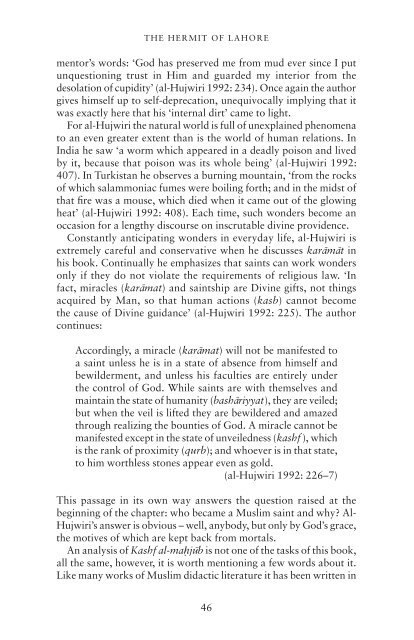Muslim Saints of South Asia: The eleventh to ... - blog blog blog
Muslim Saints of South Asia: The eleventh to ... - blog blog blog
Muslim Saints of South Asia: The eleventh to ... - blog blog blog
You also want an ePaper? Increase the reach of your titles
YUMPU automatically turns print PDFs into web optimized ePapers that Google loves.
THE HERMIT OF LAHORE<br />
men<strong>to</strong>r’s words: ‘God has preserved me from mud ever since I put<br />
unquestioning trust in Him and guarded my interior from the<br />
desolation <strong>of</strong> cupidity’ (al-Hujwiri 1992: 234). Once again the author<br />
gives himself up <strong>to</strong> self-deprecation, unequivocally implying that it<br />
was exactly here that his ‘internal dirt’ came <strong>to</strong> light.<br />
For al-Hujwiri the natural world is full <strong>of</strong> unexplained phenomena<br />
<strong>to</strong> an even greater extent than is the world <strong>of</strong> human relations. In<br />
India he saw ‘a worm which appeared in a deadly poison and lived<br />
by it, because that poison was its whole being’ (al-Hujwiri 1992:<br />
407). In Turkistan he observes a burning mountain, ‘from the rocks<br />
<strong>of</strong> which salammoniac fumes were boiling forth; and in the midst <strong>of</strong><br />
that fire was a mouse, which died when it came out <strong>of</strong> the glowing<br />
heat’ (al-Hujwiri 1992: 408). Each time, such wonders become an<br />
occasion for a lengthy discourse on inscrutable divine providence.<br />
Constantly anticipating wonders in everyday life, al-Hujwiri is<br />
extremely careful and conservative when he discusses karāmāt in<br />
his book. Continually he emphasizes that saints can work wonders<br />
only if they do not violate the requirements <strong>of</strong> religious law. ‘In<br />
fact, miracles (karāmat) and saintship are Divine gifts, not things<br />
acquired by Man, so that human actions (kasb) cannot become<br />
the cause <strong>of</strong> Divine guidance’ (al-Hujwiri 1992: 225). <strong>The</strong> author<br />
continues:<br />
Accordingly, a miracle (karāmat) will not be manifested <strong>to</strong><br />
a saint unless he is in a state <strong>of</strong> absence from himself and<br />
bewilderment, and unless his faculties are entirely under<br />
the control <strong>of</strong> God. While saints are with themselves and<br />
maintain the state <strong>of</strong> humanity (bashāriyyat), they are veiled;<br />
but when the veil is lifted they are bewildered and amazed<br />
through realizing the bounties <strong>of</strong> God. A miracle cannot be<br />
manifested except in the state <strong>of</strong> unveiledness (kashf ), which<br />
is the rank <strong>of</strong> proximity (qurb); and whoever is in that state,<br />
<strong>to</strong> him worthless s<strong>to</strong>nes appear even as gold.<br />
(al-Hujwiri 1992: 226–7)<br />
This passage in its own way answers the question raised at the<br />
beginning <strong>of</strong> the chapter: who became a <strong>Muslim</strong> saint and why? Al-<br />
Hujwiri’s answer is obvious – well, anybody, but only by God’s grace,<br />
the motives <strong>of</strong> which are kept back from mortals.<br />
An analysis <strong>of</strong> Kashf al-mah˛jūb is not one <strong>of</strong> the tasks <strong>of</strong> this book,<br />
all the same, however, it is worth mentioning a few words about it.<br />
Like many works <strong>of</strong> <strong>Muslim</strong> didactic literature it has been written in<br />
46


